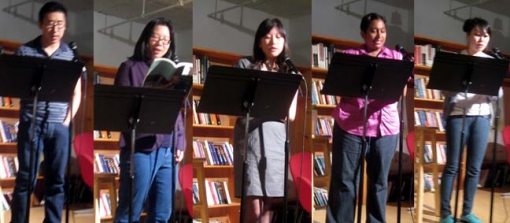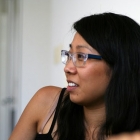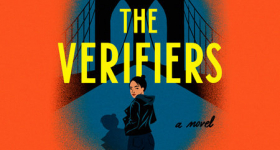Lan Samantha Chang, first Asian American and first female Director of the famed Iowa Writers’ Workshop, sat down with me to discuss her new book, All is Forgotten, Nothing is Lost (W.W. Norton 2010).
The novel charts the lives of three poet-classmates and their professor from an MFA program. Miranda, the professor, is a fierce poet and teacher whose life intersects in complicated ways with three students: Roman, who becomes an award-winning poet-professor in his own right; his eventual wife, Lucy, who struggles to write while managing her husband and son; and Bernard, a penniless romantic devoted to an unpublished, decades’-long project.
Ms. Chang is the author of two previous volumes: Hunger, comprising an eponymous novella and short stories; and Inheritance, a historical novel.
* * * *
On Friday [after the jump], you described All is Forgotten, Nothing is Lost as a “secret project.” How did the ideas and characters begin coming to you?
It definitely was a secret. I had applied for a Guggenheim Fellowship with a proposal for a book entitled “All is Forgotten, Nothing is Lost,” which was going to be a collection of three novellas about a family in the Midwest. The Guggenheim gave me two semesters off from my job, but when I sat down to write the book, I wasn’t interested. Meanwhile, I had 50 pages from a project about some poets that I had started in the summer of 2006. I gave myself one month to work on it, then another month. Then I finally finished it while I was at the Ucross Colony in Wyoming with my husband and daughter.
Another reason it was a secret was because I felt no one would be interested in it. I have become deeply invested in the teaching of young writers, but the slightly arcane ins and outs of the writing world don’t seem to be particularly translatable to a larger audience. I wrote it because I was thinking about these questions at the time: whether art can be taught, whether a person’s abilities are innate. Can a teacher provide an environment that makes it possible to get better at all? And even if you do devote your life to writing, what are the costs and liabilities involved in that kind of devotion? Ever since I started my job at the [Iowa Writers’] Workshop, these questions are in my mind every day.
It was also a secret project because it was so different from what I had written before: sort of sad stories about characters who were from Asia or in Asia. This story was nothing like that.
Does the new book represent a conscious departure from your previous writing?
There are similar themes. For instance, the theme of young people and their elders is in this. And all of my books have a story about artistic development in them. “Hunger” is all about the central character Tian’s desire to be a violinist, and in Inheritance, one of the characters writes and thinks about poetry through the whole novel. I suppose [All is Forgotten, Nothing is Lost] was sort of an offspring, then, but it appears to be something entirely different.
I also see in your books the theme of memory.
That’s true. I always write about time. I think that time is one of the fiction writer’s main subjects; it’s certainly one of mine.
There’s a part in the book where Roman describes a novelist as “someone overly interested in the well-worn paths of narrative and time.” Is this how you distinguish novelists from poets?
I think that poets and novelists have different approaches to time, and they must because of the requirements of the form. All novelists have to grapple at some point with taking their characters through time, and this grappling is not as obvious in a poem. I mean, for a novelist, it’s really a stone they have to push up the hill; it’s one of the big ones.

In the acknowledgments of All is Forgotten, Nothing is Lost, you say that your “interest in poetry and poets is that of an outsider.” Why did you choose to make the characters poets rather than fiction writers? Do you ever write poetry?
I wrote a poem in first grade and two poems in eighth grade. I would never dream of calling myself a poet, but I find the poetry world completely fascinating. Poetry and fiction are housed together in universities, but there are so few overlaps. There are very few people who write fiction and poetry a lot. It’s usually one way or the other. This has not been true throughout history, but it certainly is at this point in time in American literature. One of the things that fascinates me is that it’s impossible to argue that poets pursue the art for money. They are doing what they do purely for the art. The market is a force in the fiction world in a way that it’s not in the poetry world, and I feel that that this throws poets’ artistic lives into sharper relief. It takes a pretty unusual person to throw him or herself into a field that is so un-remunerative.
Do you read much poetry?
At times I do. I’m very enamored of Robert Hass’s poetry.
In the book, the characters Roman and Bernard approach their work as poets differently, but they both make extreme sacrifices for their writing. Is this something that needs to be done as a writer?
I do think that, in order to continue working as an artist into adulthood, there’s a certain amount of sacrifice that must take place -- sacrifice because all artists have to spend a great deal of time alone. Moving into midlife, with all of its responsibilities and attachments, I’m struck by how great an act of will is required to shut out those attachments and responsibilities to focus on artistic work. For people who grow up and have children and get married, every minute they spend on their artistic work is a moment that could be spent with their child or spouse, especially since most people must practice their art and earn a living at the same time.
As a new mother and spouse, how has your writing practice changed?
My husband is a landscape painter, and I think I married somebody artistic because I knew he would understand if I needed to get away, and I would do the same thing for him. In all honesty, if I hadn’t had two semesters off with the Guggenheim, I would not have been able to write this book. A few months after I had my daughter, I realized that it would be impossible to have a child, be married, hold down my particular job, and write at the same time. However, my daughter is now three, and she’s starting preschool, and it’s making me realize how short a time is involved in all of this. Time just flies by. Pretty soon she’ll be in school many hours a day, and I’ll miss her. There’s not enough time in life to do all the things that we want to do.
It’s telling in this regard that the character Lucy does not pursue her own writing until after she’s divorced and her son Avery leaves for college at Stanford.
I don’t think it was Avery going to Stanford that made it possible for Lucy to work; it was getting rid of Roman. Roman took up a lot of air in the room. He made it hard for his partner to be writing, and part of the problem also was Lucy’s personality: she wasn’t proud of her work, she wasn’t assertive or aggressive about it; she put other people’s needs first. Then after she realized that her marriage was in a certain way a house of cards, she got out of it and started doing good work. I don’t think of Lucy as a sad character. I think of Roman as the sad character in the book. Early in his life he put all of his eggs into the basket of poetry, and years later he discovers what it is that he was missing.
In an interview from a while back, you said that you most identified with the character Tian from the novella “Hunger.” Whom in your new book do you most identify with?
I’ve thought about this question so much, and I just don’t know. For example, in some ways, I identify with Miranda as a teacher. She could see Roman and see what his strengths and weaknesses are, but she can’t really explain them to him in a way that he understands. Also, she’s sort of an older person trying to explain something to a younger person. There’s a moment where she and Roman are talking about their relationship, and Miranda can see things that Roman can’t see at all. He sees it in terms of right and wrong. He’s very moralistic because he’s so young.
How does it feel to be teaching at Iowa, having been a student there? Is Iowa familiar because you’re from Wisconsin?
Yes, the Midwest is familiar. I love being at Iowa. That program changed my life. It’s very rare that you can say that. Beforehand I was somewhat pre-professional; I was always trying to do what my parents wanted me to do. But then I entered a community where nobody told me I’d done the wrong thing. Everyone believed in writing. Writing was the most important thing to everybody there. I was surrounded by peers whose concerns were my own, and who held dear what I held to be the most important thing in the world, which is writing. So I’ve always been grateful to that program and also to the entire state of Iowa, which was the first state in the country to start a program like this. So when I came back it was very exciting. It’s a hard job in a lot of ways, but it’s still very exciting.
Are you the first Asian American director of the Iowa Writers’ Workshop?
Yes, actually I’m the first female director and the first director who’s not white. I think it says something about American literature today that a program as established as the Iowa Writers’ Workshop can choose an Asian American to be its director without anybody turning a hair. Everyone thinks it’s fine and good.
In recent years, MFA programs have been criticized for their proliferation and the market they create, as well as their homogenizing influence. What do you think of these criticisms?
I don’t think MFA programs are for everybody. I think it’s up to the writer to decide. In my case, it was a tremendous gift for me to go there and have the experience I did. But I certainly don’t think that every writer would necessarily find it as nourishing as I did. Aesthetically, I think reports of homogenization are greatly overrated.
Now that you’ve published the book, will you go back to the Midwestern novellas?
I want to. Over the summer, I did go back to them. I had written about 100 pages about a woman who takes driving lessons—the same character Sansan from the story “The Unforgetting” in Hunger—but I have to redo the first two-thirds of it. It’s just off. It’s actually very good that I decided to write the poets project instead of this, because now I can see the flaws, so I’m letting it sit until I can figure out how to fix it.
What are you reading right now?
The most recent book I read was The Golden Notebook by Doris Lessing. I just finished it. It’s a tremendous, strange, extraordinary book.
* * * *
Several days before our interview, Ms. Chang appeared at the Asian American Writers Workshop in its new space on West 27th Street. She was joined by four local MFA students, two poets and two fiction writers, who read their works-in-progress.
The evening's theme, "All for Art," suggested the sacrifices writing demands and the ways in which writers are bound: as “friends, competitors, and even lovers,” in the words of Ken Chen, poet and Executive Director of the AAWW.











Comments